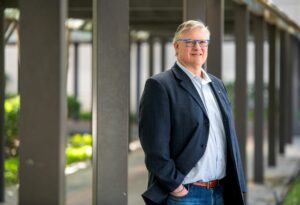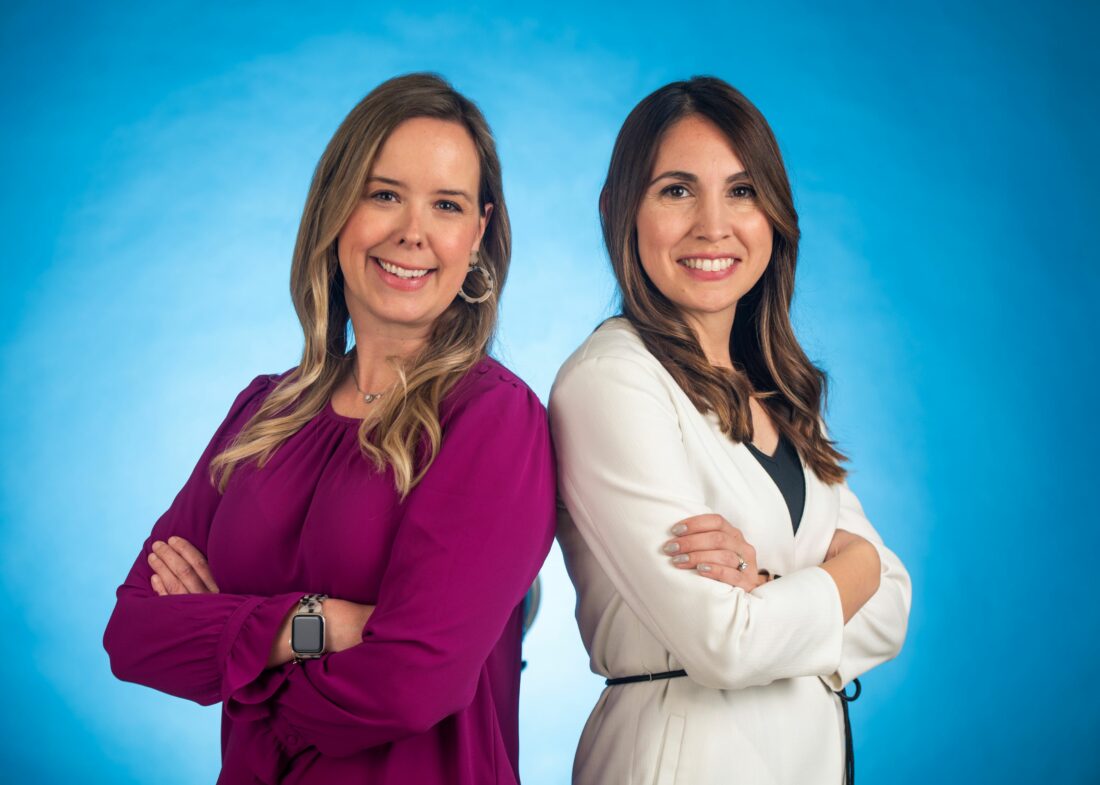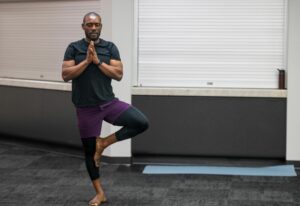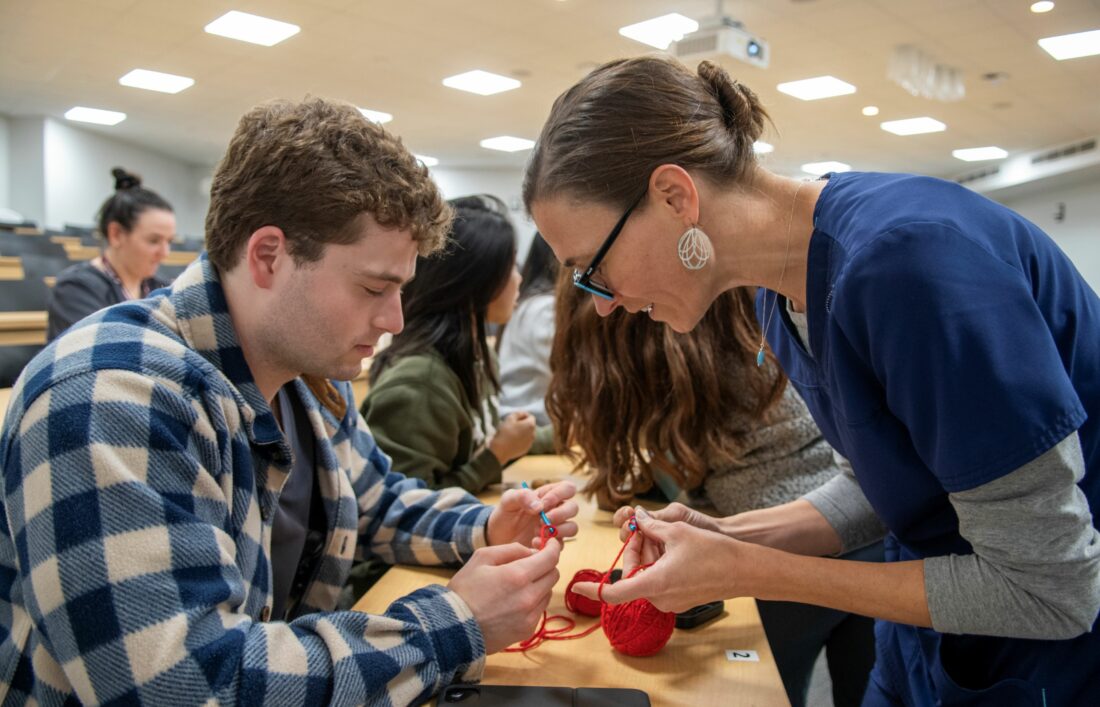Cultivating resilience

Dr. Erik Harrington, ’04, thought he lost it all.
The young pediatric resident never drank at work functions. But at a golf tournament for Texas A&M School of Dentistry faculty and residents in 2007, he started and didn’t stop.

“I was the father of three kids. I was $80,000 in debt. I owned my own practice. I was still in residency … and I thought I was losing my mind,” he said.
Harrington’s story is not uncommon. Depression, anxiety and stress has snaked through generations of dental students, but feelings that were once considered a rite of passage are now understood to be a serious blow to students’ mental health and a threat to their overall well-being.
Instead of being told to “shake it off” or “grind through it,” students are now learning how to take better care of themselves through the school’s new Mental Health and Wellness Committee, spearheaded by Drs. Alicia Spence and Janna Burnett.
Overwhelming need
Harrington’s story and his financial support is at the foundation of the program. The morning after the 2007 golf tournament he called the school with the intention of quitting.
“I’m a fairly strong believer that we’re where we are because of all the decisions we’ve made – all the good ones and all the bad ones,” he said. “Dr. [Alton] McWhorter, who recognized the strain and the despair, didn’t come down on me. Instead, he created a space for me to finish.”
Harrington stepped away from the program to go to rehab, returned and graduated in 2008.
Today he is a board-certified pediatric dentist, handling some of the most complicated cases in Dallas County and a vocal mental health advocate. In 2022, he navigated a mental health crisis with one of his own children, and simultaneously, dental school faculty members were seeing an uptick in student stress and anxiety.

Burnett, a clinical associate professor in comprehensive dentistry, said students were regularly confiding in her and Spence, a clinical assistant professor in comprehensive dentistry. Although they were glad students felt comfortable talking to them, “it came to a point where it was becoming outside the scope of what we felt comfortable doing,” Burnett said.
“Also, we just felt like we should be doing more to try and get ahead of the problem to build up resiliency because everyone was very flappable,” she explained. “Dental school has always been difficult, but it’s always been kind of a culture of ‘we got through, so can you.’ And although that’s true, there’s more we can do to support them.”
Fourth-year dental student Parmida Shamsaifar said she confided in Spence during her D2 year in 2021.
“I just went to her and was like ‘I’m not doing OK in any aspect,’” she said. “Yes, I was in dental school and those dreams had kind of come true, but I was so unhappy with every other part of my life. I knew school would be a lot, but that wasn’t even really it for me. I had lost family members due to COVID, there was the isolation and just the stress of school and life and everything.”
Shamsaifar, who is a student ambassador for the Mental Health and Wellness Committee, said she eventually saw a psychiatrist and a therapist and was diagnosed with major depressive disorder and generalized anxiety. Her struggles played a part in Spence and Burnett seeking to secure mental health resources for students and forming the committee.
“We made a presentation to Administrative Council, and it was not difficult to get everyone to agree,” Spence said. “They all recognized this was needed at the school.”
Fellow faculty member Dr. Martha Alvarez knew Harrington might like to help and suggested Spence and Burnett reach out to him. He gladly joined the effort, making a donation to kick things off and offering to speak at the first Wellness Wednesday.
“That really threw gasoline on the fire and got us off the ground,” Burnett said.
Education and camaraderie
Wellness Wednesday is a cornerstone of the program. Offered once a month, each session includes a free meal, a stress relieving activity and a lecture covering stress management, time management or overall health and wellness.
“Wellness Wednesday is one of the only events where students consistently show up, and if they don’t, it’s usually because they’re on rotation,” Shamsaifar said.
Sessions have included crochet lessons, cooking classes, yoga and even a kazoo sing-along. A favorite among students was dad jokes with Dr. Amp Miller, a longtime professor in comprehensive dentistry.

Harrington spoke at the first Wellness Wednesday, bringing many students to tears with his personal story.
“He gave a really powerful presentation,” Burnett said. “One of the tricky things has been addressing the serious ramifications of poor mental health. It can feel heavy sometimes, so we want to take that seriously, but also make the events fun. It’s been a delicate balance to make sure we’re offering real, tangible help to people without bringing them down.”
The committee has also partnered with campus offices and student organizations for specific projects, including opening a pocket pantry with the Office of Student Affairs and LIGHT to address food insecurity among students. The committee also teamed up with the Music Society and Student National Dental Association to revive the school talent show, encouraging students to pursue creative passions outside of dentistry, and they hosted a holiday market in conjunction with a Music Society holiday recital.
“We used to have all these grand traditions at the school, and then all those went away after COVID,” Burnett said. “There’s a lot of research that shows that lonely people have poor mental health, so I think that rebuilding that sense of community and bringing back traditions is helpful because not only does everyone get together, but you also see a different side of people.”
The committee’s latest work includes advocating for an on-campus counselor, planning mental health and crisis training for faculty and staff and seeking exercise classes or discounted gym memberships for students.
Third-year dental student Audra McCormick and a student ambassador on the Mental Health and Wellness Committee said she suffered a family tragedy during her D1 year and would have benefited from an on-campus counselor.
“Telehealth is helpful, but sometimes it’s difficult to connect when you’re not in-person,” she said. “You don’t have the ability to perceive changes in body language and other nuances. I wrote a letter describing my experience to help promote hiring an on-site counselor and highlight the faculty stepping in to help me through that challenging time.
“We have a diverse population on this campus and with that comes diverse needs and unique challenges,” McCormick said. “To create a higher caliber of health care provider, it is the school’s responsibility to ensure that students are prepared both physically and mentally for the workforce.”
How to help
Spence said post-COVID the need is greater than what most people realize.
“We have more students who are taking care of family members than ever before,” she said. “The cost of rent has gone up and groceries have gone up, and they’re having a harder time. They need help in ways that we never before considered.”
Harrington contends that dentistry, and specifically Texas A&M School of Dentistry, can lead the way in improving mental health among students and professionals in the health care industry.
“One thing that’s unique about dentistry,” he said, “we were the first to employ X-rays in a way that was substantially fundamental. We were the first ones to employ nitrous anesthesia; dentistry has the capability and history to be more nimble … not like a massive Titanic … but be more nimble and take the mental health crisis head on.
“We can be a light for the rest of health care.”
In the fall of 2023, Harrington helped establish an endowment through the Texas A&M Foundation to increase students’ access to mental health resources, including the efforts of the Mental Health and Wellness Committee. By April of 2024, ongoing fundraising for the Harrington Student Wellness Endowment had surpassed $100,000.

In addition to the endowment, Burnett said donors could also consider sponsoring a Wellness Wednesday lunch or activity or they could even volunteer their time to share a talent or skill with students during the monthly program.
“It’s been a lot of work, but this is affecting real change in the student population,” Burnett said. “Our graduating students tell us they’re going to miss Wellness Wednesdays, and we can see a marked difference in some of the students who came to us and started this journey.
“They seem so much happier and more resilient.”
Harrington commended the school for hearing the outcry and taking action.
“Historically, mental health has been stigmatizing, and it will continue to be until more people share their stories,” Harrington said. “Recognition and action by an institution such as the dental school is a great step forward.
“Everything has to start somewhere, and someone has to have the courage to plant a flag.”
This story originally appeared in the spring 2024 issue of Texas A&M Dentistry magazine.